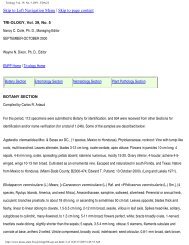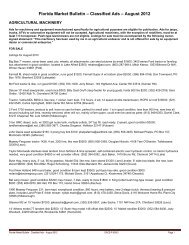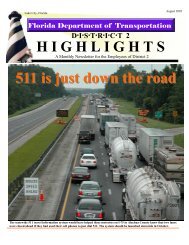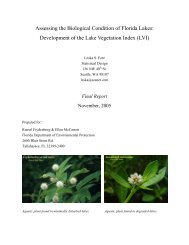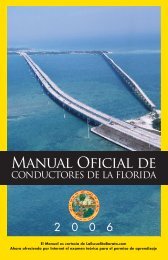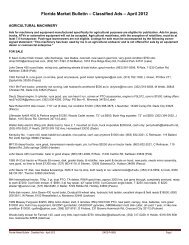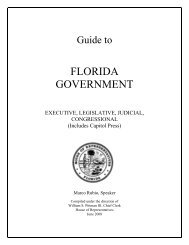Version A final setup - Florida House of Representatives
Version A final setup - Florida House of Representatives
Version A final setup - Florida House of Representatives
Create successful ePaper yourself
Turn your PDF publications into a flip-book with our unique Google optimized e-Paper software.
ARTICLE VII CONSTITUTION OF THE STATE OF FLORIDA ARTICLE VII<br />
the beginning <strong>of</strong> the fiscal year. State revenues<br />
collected for any fiscal year in excess <strong>of</strong> this<br />
limitation shall be transferred to the budget<br />
stabilization fund until the fund reaches the<br />
maximum balance specified in Section 19(g) <strong>of</strong><br />
Article III, and thereafter shall be refunded to<br />
taxpayers as provided by general law. State<br />
revenues allowed under this subsection for any<br />
fiscal year may be increased by a two-thirds vote<br />
<strong>of</strong> the membership <strong>of</strong> each house <strong>of</strong> the legislature<br />
in a separate bill that contains no other<br />
subject and that sets forth the dollar amount by<br />
which the state revenues allowed will be increased.<br />
The vote may not be taken less than<br />
seventy-two hours after the third reading <strong>of</strong> the<br />
bill. For purposes <strong>of</strong> this subsection, “state<br />
revenues” means taxes, fees, licenses, and<br />
charges for services imposed by the legislature<br />
on individuals, businesses, or agencies outside<br />
state government. However, “state revenues”<br />
does not include: revenues that are necessary to<br />
meet the requirements set forth in documents<br />
authorizing the issuance <strong>of</strong> bonds by the state;<br />
revenues that are used to provide matching<br />
funds for the federal Medicaid program with<br />
the exception <strong>of</strong> the revenues used to support<br />
the Public Medical Assistance Trust Fund or its<br />
successor program and with the exception <strong>of</strong><br />
state matching funds used to fund elective<br />
expansions made after July 1, 1994; proceeds<br />
from the state lottery returned as prizes; receipts<br />
<strong>of</strong> the <strong>Florida</strong> Hurricane Catastrophe Fund;<br />
balances carried forward from prior fiscal<br />
years; taxes, licenses, fees, and charges for<br />
services imposed by local, regional, or school<br />
district governing bodies; or revenue from taxes,<br />
licenses, fees, and charges for services required<br />
to be imposed by any amendment or revision to<br />
this constitution after July 1, 1994. An adjustment<br />
to the revenue limitation shall be made by<br />
general law to reflect the fiscal impact <strong>of</strong><br />
transfers <strong>of</strong> responsibility for the funding <strong>of</strong><br />
governmental functions between the state and<br />
other levels <strong>of</strong> government. The legislature shall,<br />
by general law, prescribe procedures necessary<br />
to administer this subsection.<br />
History.—Am. H.J.R. 2053, 1994; adopted 1994.<br />
SECTION 2. Taxes; rate.—All ad valorem<br />
taxation shall be at a uniform rate within each<br />
taxing unit, except the taxes on intangible<br />
personal property may be at different rates but<br />
shall never exceed two mills on the dollar <strong>of</strong><br />
assessed value; provided, as to any obligations<br />
secured by mortgage, deed <strong>of</strong> trust, or other lien<br />
on real estate wherever located, an intangible tax<br />
<strong>of</strong> not more than two mills on the dollar may be<br />
levied by law to be in lieu <strong>of</strong> all other intangible<br />
assessments on such obligations.<br />
B–30<br />
SECTION 3. Taxes; exemptions.—<br />
(a) All property owned by a municipality and<br />
used exclusively by it for municipal or public<br />
purposes shall be exempt from taxation. A<br />
municipality, owning property outside the municipality,<br />
may be required by general law to make<br />
payment to the taxing unit in which the property is<br />
located. Such portions <strong>of</strong> property as are used<br />
predominantly for educational, literary, scientific,<br />
religious or charitable purposes may be exempted<br />
by general law from taxation.<br />
(b) There shall be exempt from taxation,<br />
cumulatively, to every head <strong>of</strong> a family residing in<br />
this state, household goods and personal effects<br />
to the value fixed by general law, not less than<br />
one thousand dollars, and to every widow or<br />
widower or person who is blind or totally and<br />
permanently disabled, property to the value fixed<br />
by general law not less than five hundred dollars.<br />
(c) Any county or municipality may, for the<br />
purpose <strong>of</strong> its respective tax levy and subject to<br />
the provisions <strong>of</strong> this subsection and general law,<br />
grant community and economic development ad<br />
valorem tax exemptions to new businesses and<br />
expansions <strong>of</strong> existing businesses, as defined by<br />
general law. Such an exemption may be granted<br />
only by ordinance <strong>of</strong> the county or municipality,<br />
and only after the electors <strong>of</strong> the county or<br />
municipality voting on such question in a referendum<br />
authorize the county or municipality to<br />
adopt such ordinances. An exemption so granted<br />
shall apply to improvements to real property<br />
made by or for the use <strong>of</strong> a new business and<br />
improvements to real property related to the<br />
expansion <strong>of</strong> an existing business and shall also<br />
apply to tangible personal property <strong>of</strong> such new<br />
business and tangible personal property related<br />
to the expansion <strong>of</strong> an existing business. The<br />
amount or limits <strong>of</strong> the amount <strong>of</strong> such exemption<br />
shall be specified by general law. The period <strong>of</strong><br />
time for which such exemption may be granted to<br />
a new business or expansion <strong>of</strong> an existing<br />
business shall be determined by general law.<br />
The authority to grant such exemption shall<br />
expire ten years from the date <strong>of</strong> approval by<br />
the electors <strong>of</strong> the county or municipality, and<br />
may be renewable by referendum as provided by<br />
general law.<br />
(d) Any county or municipality may, for the<br />
purpose <strong>of</strong> its respective tax levy and subject to<br />
the provisions <strong>of</strong> this subsection and general law,<br />
grant historic preservation ad valorem tax exemptions<br />
to owners <strong>of</strong> historic properties. This<br />
exemption may be granted only by ordinance <strong>of</strong><br />
the county or municipality. The amount or limits<br />
<strong>of</strong> the amount <strong>of</strong> this exemption and the requirements<br />
for eligible properties must be specified by<br />
general law. The period <strong>of</strong> time for which this



